You Don't Mess with the Zohan
 for crude and sexual content throughout, language and nudity.
for crude and sexual content throughout, language and nudity.
Reviewed by: Maria Gorshin
CONTRIBUTOR (first time reviewer)
| Moral Rating: | Extremely Offensive |
| Moviemaking Quality: |
|
| Primary Audience: | Adults Teens |
| Genre: | Comedy |
| Length: | 1 hr. 53 min. |
| Year of Release: | 2008 |
| USA Release: |
June 6, 2008 |
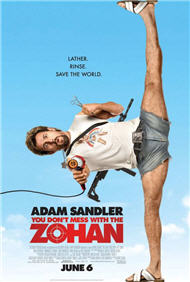
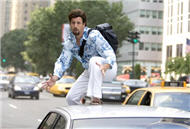
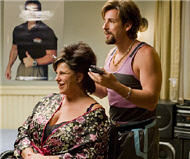
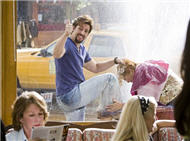
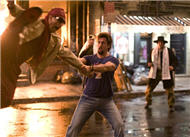
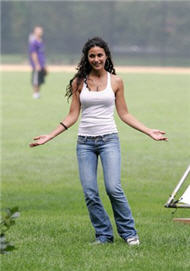
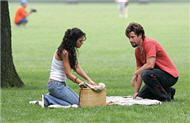
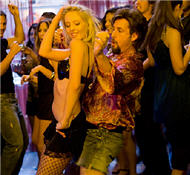
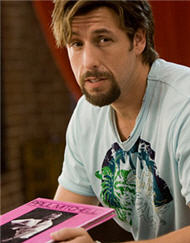
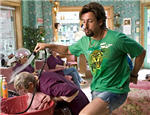
What are the consequences of sexual immorality? Answer
| Featuring |
|---|
| Adam Sandler, Rob Schneider, Danny A. Abeckaser, Omid Abtahi, Aesop Aquarian, [more] |
| Director |
|
Dennis Dugan ‘Happy Gilmore,’ ‘I Now Pronounce You Chuck and Larry,’ ‘Big Daddy’ |
| Producer |
| Barry Bernardi, Jack Giarraputo, Daryl Kass, Aldric La'Auli Porter, Adam Sandler, Robert Smigel |
| Distributor |
“Lather. Rinse. Save the world.”
You Do Not Mess With the Zohan… no, really… you do not mess with the Zohan. At least not if you’re a Christian with delicate sensibilities. This very funny, if highly-offensive movie is charming and delightful enough to coax laughter even out of the staunchest believer. Are there any truly redeeming qualities about this movie? Hardly. Do I recommend it? Absolutely. But leave the children at home. Adam Sandler is at his tasteless best here but this time the story has a heart, as well as a message of peace, and the main character is as loveable as he is irreverent.
Few topics are as complex and volatile as the Arab-Israeli conflict over land in Israel. Sandler strips away the complexities to give you a hilarious romp featuring Arabs and Israelis who flee to America to “get away from all of the hate back home” and start their lives anew.
The film opens in a Middle East setting we rarely see featured on the evening news these days—a peaceful, sunny beach in Israel where everyone is having fun and the only action comes from Hacky Sack, tug-of-war and disco dancing. The first few moments of the film establish Zohan’s character: he’s strong, comfortable in his own skin, widely-admired and capable of unusual feats—including catching a freshly-grilled fish with his tuchis. (You’ll hear lots of amusing yiddishisms in this movie—real as well as invented.) A few minutes into the film, Zohan is simultaneously attending to a beachside grill, playing paddleball with a spatula and dancing nude (viewed from behind) for an appreciative group of bikini-clad beauties and a goofy, fully-dressed male friend. Suddenly, a military helicopter appears and Zohan’s seaside vacation comes to an abrupt end as he is whisked off to a briefing with his fellow Israeli commandos. The story really gets rolling after an explosive mission in Palestine ends with Zohan exiting a life marked by never-ending Arab/Israeli conflict in favor of making people “silky smooth” as a hairdresser in America.
The film takes us along with Zohan as he spins and gyrates from one crazy situation into the next in a post 9/11 New York City peopled by hard-working Israelis and Palestinians and the people who regard them with suspicion. This leads to some great moments of comedy—like when Zohan disavows his Israeli background by telling his new friends, in an Israeli accent as thick as the hummus he uses for just about everything, that he is “Australian and Mount Everest… this is what you are hearing.” Zohan and his arch nemesis, a Palestinian terrorist known as The Phantom (John Turturro), find themselves locked in a rivalry that provides plentiful opportunities for great action sequences. All of the actors in this movie put in hugely entertaining performances, especially Sandler and Turturro who throw themselves into their roles with abandon.The movie is endearingly funny and, unlike many recent comedies, this one never runs out of steam. The story moves along at a pleasing clip, driven forward by Zohan’s hairstyling dreams and a high-energy soundtrack of danceable 80s tunes and Middle Eastern pop music. The unique circumstance of having Palestinians and Israelis working side by side in the same community as they make their way in a new city allows for situations that get to the heart of what it can be like for recent, Middle Eastern immigrants living in New York City during these difficult times.
So how does Zohan the movie manage to be so offensive when it’s so genuinely endearing and clever? Like most modern comedies, Zohan is absolutely soaked in sex, sexual innuendo, rough language, vulgarity and relentless references to the male anatomy. For every moment of hilarity (and there are many) you will have to go through much that is rude—and even disturbing. In one scene a son finds his mother having sex with a young friend he has brought home for the first time. Instead of being embarrassed, the mother suggests to the son that what he needs is to go to a nightclub and “get some st*nk.” On frequent occasions after that the mother engages in sexual discussions and behaviors in front of her son while his disgusted reactions are played to make him seem hopelessly unhip. At the end of the movie, when the son begins to act out sexually, Zohan and the mom express their approval. “I knew he had it in him,” says the mother with a smirk.
But the real heavy offenses are left to Zohan himself, who is consumed with “making the sticky,” the “big bang boom” and staying “steeve” for the ladies. His carefree spirit and appreciation of beauty in women of all sizes, ages and colors is admirable but the sequences featuring him pleasuring elderly women during their shampoos, one after another, truly go too far. These sequences could have been done in good taste—for the most part they were so joyful and the ladies looked so lovely—but they were marred by unnecessary vulgarities that turned scenes that could have been tasteful into cringe-worthy moments. (i.e., creamy white shampoos oozing from phallic shampoo bottles near the ladies’ open mouths; Zohan gyrating suggestively up against the behind of an elderly customer who is bent over a sink as he shampoos her hair.)
When Zohan discovers that a great way to cultivate the loyalty of his elderly clientele at the hair salon is to end each appointment with a rigorous bout of earth-shaking, off-screen sex, the audience has to endure endless rounds of shelves tumbling off the wall, moaning, and then the sight of dazed and disheveled older ladies stumbling out of Zohan’s supply closet.
Despite these huge lapses in good taste, Zohan does carry several positive messages: There is more to life than war; with hate there are no winners; America is a country where anyone can make their dreams come true; you can’t have secrets in a good relationship; there is power in unity. Zohan also clearly loves and respects his parents and considers what they would think before he makes big decisions. By the end of the movie, we also see Zohan fall in love and suddenly realize that he can be with only one woman.
You might be wondering how the Arab/Israeli issue is handled in this film. In a word, it’s evenhanded. No sides are taken. The only case here is made for peace and brotherhood. In one scene a Palestinian calls Zohan a “landgrabber” and shouts that “my people have settled this land for hundreds of years!” Zohan defends himself with a little sarcasm, “Oh, yes and my people have never set foot in this land before. It’s not so cut and dried.” There is some violence in this movie but it is bloodless and cartoonish, except for a few explosions. The language is peppered with countless references to sex but most of the words are in fake Yiddish. Still, you’ll come across sh*t seven times, t*ts three times, b*tch and son of a b*tch three times and mother f*cher once, although it’s cut off at the end. The Lord’s name is taken in vain only once.
Violence: Moderate / Profanity: Moderate / Sex/Nudity: Heavy
See list of Relevant Issues—questions-and-answers.


Moral rating: / Moviemaking quality: 4
Moral rating: Offensive / Moviemaking quality: 3
And sometimes—a movie is just brain candy—fun-filled silliness when one allows their brain to take a vacation.
BUT Zohan is not even brain candy. It is cheap in its humor, gags are ridiculous. It does not have a redeeming quality about it. I left with about 30 minutes left and felt gross and violated. It was contaminating.
Seriously perverse and sick.
Moral rating: Extremely Offensive / Moviemaking quality: 1
Moral rating: Extremely Offensive / Moviemaking quality: 3½
All in all, it was a disgusting movie. My advice: DO NOT watch it. The group leaders who chose the movie were absolutely mortified that they took a group of 17 teenagers to see trash like that. Though we did get “Disco Break” from it, that was the only thing slightly positive about the whole experience, and I can only wish that I could erase the rest of it from my mind.
Moral rating: Extremely Offensive / Moviemaking quality: 3½
Moral rating: Extremely Offensive / Moviemaking quality: 3
Moral rating: Extremely Offensive / Moviemaking quality: 1½
Other than that is was all perverted comedy. The guy goes to America defends a nerdy helpless guy from a jerk. The nerd takes him home to have a home cooked meal from his mother and when later walking in house he walks in on his mother having intercourse with the zohan while both are totally nude. The scene is extremely graphic and is only one of many. Were not talking a mans bare back covering a half naked woman. the first offensive scene is a side shot of the woman on her knees having intercourse. This scene and many other scenes have much more nudity than I have ever seen in a movie …ever. Many more times are there scenes with the Zohan and this guy's mother.
There was a talk the Zohan had with the guy about “don't you want your mother to be happy” “didn't you see her face when It went in” was the exact quote. There was a severely high tolerance for fornication. Including the plot where the fornicating pair were involved in talking about him finding his true love though they are fornicating on side as well as all the women he does at work.See all »
Moral rating: Extremely Offensive / Moviemaking quality: 2
Moral rating: Extremely Offensive / Moviemaking quality: 2½
Moral rating: Extremely Offensive / Moviemaking quality: 1½
I have actually enjoyed much of Adam Sandler’s humor, despite being offended when he crossed certain lines of morally. But, this filthy movie was so completely and totally revolting that I could not find anything the least bit amusing. Finally, about half way into the movie during a scene in which Zohan is shampooing an older woman’s hair, inducing her and all the woman, including a dog, to become sexually aroused, we all practically jumped out of seats and filed out of the theater. I was reeling with disgust, not only with those who had any part of this production, but with myself for not leaving after the first five minutes. In fact, I am sickened that I contributed almost $80.00 toward the gross income of the premier of this abominable movie.
I understand that this movie even got bad reviews from the secular media, its criticisms involving a range of concerns, including moral decadence. Instead of attempting a qualitative analysis, I simply want to warn all Christians: Do not see this movie, and more importantly, do not allow your children or teenagers to be exposed to this depraved rubbish.
Moral rating: Extremely Offensive / Moviemaking quality: 4
Under the guise of being a hair stylist, Zohan flatters and seduces older ladies by removing their ear ring with his mouth when it gets in the way of the shampoo bowl, rubs his groin against their shoulder while shampooing them, and after their hair cut, takes the client into the back room where he does things with the ladies that make shampoo bottles fall off the shelves of an adjacent wall.
Whenever Zohan was wearing only underpants, the size of his groin area was obscenely exaggerated. And this occurred several times throughout the movie.
The movie wasn't as embarrassing as some other movies I have seen, but was perhaps the most morally “over the top” movie I have seen Adam Sandler star in.
Moral rating: Offensive / Moviemaking quality: 4
Moral rating: Extremely Offensive / Moviemaking quality: 3
Moral rating: Extremely Offensive / Moviemaking quality: 3½
Moral rating: Extremely Offensive / Moviemaking quality: 3
All in all, it was a disgusting movie. My advice: DO NOT watch it. The group leaders who chose the movie were absolutely mortified that they took a group of 17 teenagers to see trash like that. Though we did get “Disco Break” from it, that was the only thing slightly positive about the whole experience, and I can only wish that I could erase the rest of it from my mind.
Moral rating: Extremely Offensive / Moviemaking quality: 3½
Moral rating: Extremely Offensive / Moviemaking quality: 2
The fruit coming from this actor is not good. Jesus speaks of the man that brings forth good fruit and the one that doesn't. Also, out of the mouth the heart speaks. I could go on. One can easily see from Matthew 12 that this kind of behavior is not God honoring. Parents and grandparents have a responsibility to God to raise up a Godly inheritance. I apologized to our grandson for making such a poor choice. I would hope that someday Adam Sandler would make a choices pleasing to God and leave his old ways behind.
Moral rating: Extremely Offensive / Moviemaking quality: 3
Moral rating: Extremely Offensive / Moviemaking quality: 3½
From a Christian point of view this movie was very offensive. The entire thing is about sex and all the implied sex was really disturbing. In my opinion it was more disturbing than the movie “Saw 2.” Just go watch “Happy Gilmore” again, and enjoy yourself.
Moral rating: Very Offensive / Moviemaking quality: 2
Moral rating: Very Offensive / Moviemaking quality: 3
Moral rating: Very Offensive / Moviemaking quality: 1½
Moral rating: Extremely Offensive / Moviemaking quality: 4½
Moral rating: Offensive / Moviemaking quality: 3½
Moral rating: Very Offensive / Moviemaking quality: 1½


My Ratings: Moral rating: Offensive / Moviemaking quality: 4